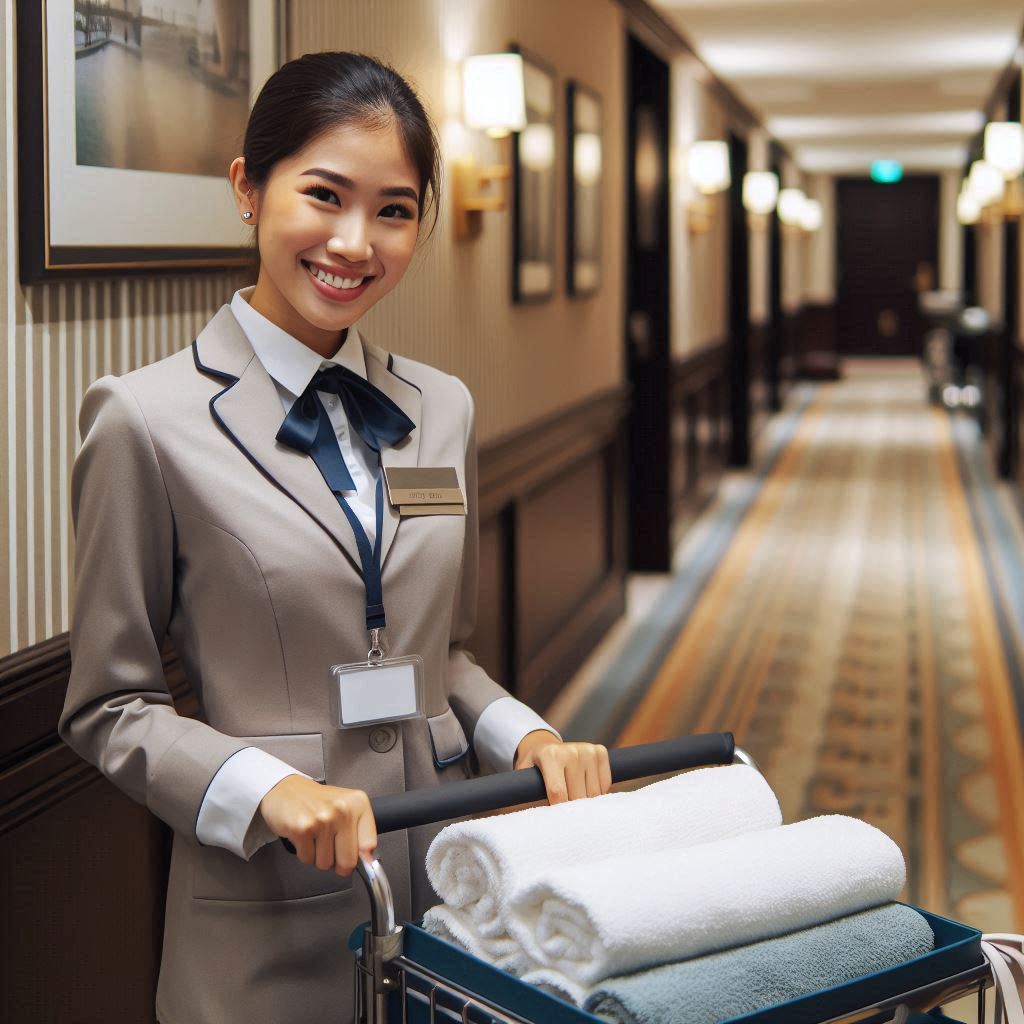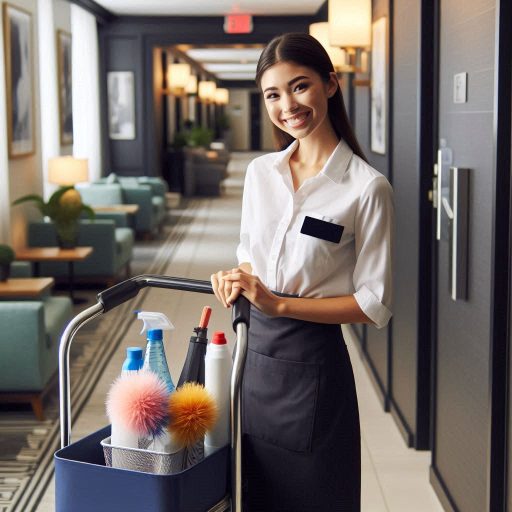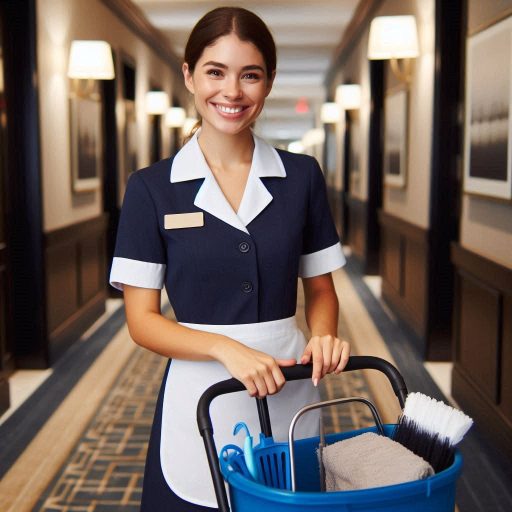Introduction
Communication skills are vital in the housekeeping department.
They enable staff to share information effectively and perform their duties efficiently.
Clear communication ensures that all team members understand their responsibilities.
This clarity reduces confusion and minimizes errors during daily tasks.
Effective communication also enhances teamwork.
When housekeepers communicate openly, they can coordinate better and support each other.
This collaboration leads to increased productivity, allowing staff to complete tasks more quickly.
In a busy hotel environment, time is of the essence.
Efficient communication helps prioritize tasks, ensuring that high standards of cleanliness are maintained.
Additionally, strong communication skills foster a positive work atmosphere.
Housekeepers who feel comfortable sharing their thoughts contribute to a more cohesive team.
This unity boosts morale and encourages staff to tackle challenges together.
Moreover, effective communication extends to interactions with guests.
Housekeepers who communicate well can address guest requests and concerns promptly.
This responsiveness enhances the overall guest experience, leading to positive reviews and repeat visits.
Communication skills play a crucial role in housekeeping.
By prioritizing effective communication, hotels can enhance productivity and efficiency, ensuring guest satisfaction and smooth operations.
Clear instructions
Communication Skills Help in Giving Clear Instructions to Housekeeping Staff on Tasks That Need to Be Done
Effective communication skills are vital in housekeeping.
They enable supervisors to give clear instructions to staff.
Clear instructions help ensure that all tasks are understood and executed properly.
Housekeeping roles involve various responsibilities, and clear communication enhances task efficiency.
When supervisors communicate effectively, they set expectations for their teams.
Staff members know exactly what tasks they need to complete.
This clarity reduces confusion and promotes accountability among the team.
Each staff member can focus on their responsibilities without second-guessing their assignments.
Misunderstandings often occur in a busy environment like a hotel.
Poor communication can lead to incomplete tasks or errors.
For instance, if a supervisor fails to specify cleaning protocols, staff may overlook important steps.
This oversight can result in guest dissatisfaction, affecting the hotel‘s reputation.
On the other hand, when supervisors provide clear, concise instructions, the likelihood of mistakes decreases.
Housekeepers can prioritize their work efficiently and understand the desired outcomes.
Clear instructions allow staff to complete their tasks in a timely manner, which is crucial in the hospitality industry.
Using simple language also aids in effective communication.
It ensures that everyone, regardless of language proficiency, can understand the instructions.
Supervisors should encourage questions from staff to clarify any uncertainties.
This open dialogue fosters a culture of teamwork and support.
Regular training sessions can enhance communication skills within the team.
These sessions can focus on effective instruction techniques, helping staff articulate their needs clearly.
Training encourages teamwork and builds strong relationships among team members.
Additionally, using visual aids can complement verbal instructions.
Charts, checklists, and pictorial guides can provide clarity and serve as reminders for housekeeping tasks.
Visual aids make it easier for staff to follow protocols and maintain high standards.
Avoid Misunderstandings and Ensure That Tasks Are Completed Accurately and Efficiently
Feedback is another critical component of communication in housekeeping.
Supervisors should provide constructive feedback on completed tasks.
This feedback helps staff understand areas for improvement and reinforces positive behaviors.
A culture of continuous improvement emerges, benefiting both staff and guests.
Effective communication skills are essential for clear instructions in housekeeping.
They help avoid misunderstandings and ensure tasks are completed accurately.
Supervisors who prioritize clear communication enhance overall efficiency and promote a positive work environment.
This focus ultimately leads to better guest experiences and higher satisfaction rates.
By investing in communication skills, housekeeping teams can work more cohesively and effectively, achieving their goals with confidence.
Read: How to Balance Work and Personal Life in Childcare
Team Coordination
Effective Communication Fosters Better Coordination Among Housekeeping Staff
Effective communication is crucial for successful team coordination in housekeeping.
It helps staff work together efficiently, ensuring that all tasks are completed.
Clear communication channels foster collaboration among team members.
When housekeepers understand their roles, they can coordinate their efforts effectively.
Team coordination enhances the overall cleaning process.
For example, if a room attendant knows when to expect support, they can plan accordingly.
This awareness reduces downtime and improves workflow.
Staff can share information about specific cleaning needs or challenges in a timely manner.
Regular team meetings can enhance communication and coordination.
These meetings allow staff to discuss daily goals, share updates, and address concerns.
Everyone becomes aware of the priorities for the day, fostering a sense of unity.
Open discussions during meetings build trust among team members.
Supervisors play a vital role in facilitating communication.
They should encourage staff to voice their ideas and concerns.
This practice promotes a sense of ownership and engagement among housekeepers.
When staff feels heard, they are more likely to collaborate effectively.
Using technology can also improve coordination among housekeeping staff.
Messaging apps or group chats allow for real-time communication.
Staff can quickly share updates about completed tasks or request assistance.
This immediate feedback loop streamlines operations and enhances team dynamics.
Encourage Teamwork and Collaboration to Achieve Common Goals in Maintaining Cleanliness and Orderliness
Encouraging teamwork is essential for achieving common goals.
Housekeeping staff should work together to maintain cleanliness and orderliness.
Teamwork improves efficiency, as members can help each other with larger tasks.
For instance, two housekeepers can tackle deep cleaning in a room, completing the task faster.
Recognizing team efforts reinforces a collaborative spirit.
Supervisors should celebrate achievements, whether big or small.
Acknowledgment boosts morale and motivates staff to continue working together.
When individuals feel appreciated, they are more likely to contribute positively to the team.
Incorporating team-building activities can also strengthen coordination.
These activities foster camaraderie and enhance relationships among staff.
Strong interpersonal relationships lead to better communication and cooperation on the job.
Housekeepers who trust one another are more likely to collaborate effectively.
Additionally, establishing clear roles within the team helps streamline coordination.
When each staff member knows their responsibilities, they can support each other more effectively.
This clarity reduces overlap in tasks and enhances productivity.
Effective communication is key to fostering better team coordination in housekeeping.
It encourages teamwork and collaboration, helping staff achieve common goals.
When housekeeping teams work together harmoniously, they create a clean and welcoming environment for guests.
By prioritizing communication, housekeeping staff can enhance their overall efficiency and service quality.
Read: Best Pet Grooming Schools in the United States
Guest satisfaction
Proper Communication Skills Are Essential When Interacting with Guests
Effective communication skills are vital for housekeeping staff interacting with guests.
Housekeepers often serve as the first point of contact for guests.
Their ability to communicate effectively can significantly impact guest satisfaction.
A friendly greeting and a warm smile can set a positive tone for the guest’s experience.
Listening actively to guests is crucial in addressing their needs.
When housekeepers pay attention to guest requests, they can respond appropriately.
This attentiveness demonstrates respect and professionalism, making guests feel valued.
For example, if a guest requests extra towels, housekeepers should acknowledge the request and deliver them promptly.
Housekeepers must also communicate clearly about services provided.
They should inform guests about housekeeping schedules and policies.
This transparency helps manage guest expectations and minimizes misunderstandings.
When guests know when to expect service, they can plan their activities accordingly.
Handling guest complaints requires excellent communication skills.
When issues arise, housekeepers should remain calm and empathetic.
They must listen to the guest‘s concerns without interruption.
By acknowledging the issue, housekeepers validate the guest’s feelings.
This approach fosters trust and encourages open dialogue.
After addressing a concern, housekeepers should follow up with guests.
A simple check-in can reassure guests that their satisfaction matters.
This follow-up shows commitment to providing excellent service.
It also offers an opportunity for guests to share additional feedback.
Ensure That Guest Requests and Feedback Are Addressed Promptly and Professionally to Enhance Guest Satisfaction
Promptly addressing guest requests is critical to enhancing satisfaction.
Housekeepers should prioritize urgent requests, such as cleaning up spills or providing toiletries.
Quick responses to guest needs create a positive impression.
When guests feel that their requests are met swiftly, they are more likely to leave satisfied.
Professionalism is equally important when addressing guest feedback.
Housekeepers should remain courteous and respectful, even if feedback is negative.
Acknowledging the guest’s feelings demonstrates empathy and professionalism.
This response can help de-escalate potentially tense situations.
Moreover, housekeepers should document guest requests and feedback accurately.
Keeping records ensures that no request goes unnoticed.
It also helps supervisors follow up on specific issues if needed.
Accurate documentation aids in maintaining a high standard of service.
Team collaboration enhances the ability to address guest needs effectively.
Housekeepers should communicate guest requests to relevant departments, such as maintenance or front desk staff.
This teamwork ensures that all guest needs are addressed efficiently.
Proper communication skills are essential for enhancing guest satisfaction in housekeeping.
By actively listening, addressing requests promptly, and responding professionally, housekeepers can create a positive guest experience.
These practices foster a welcoming environment and encourage guests to return.
Ultimately, effective communication leads to higher guest satisfaction and loyalty.
Read: Finding the Right Work-Life Balance as a Nail Tech

Conflict resolution
Good Communication Skills Are Crucial in Resolving Conflicts Among Housekeeping Staff
Effective communication skills play a vital role in conflict resolution among housekeeping staff.
Conflicts can arise from misunderstandings, differing opinions, or workload pressures.
Addressing these issues promptly prevents them from escalating.
Housekeepers must feel comfortable discussing their concerns openly.
Housekeeping supervisors should encourage open dialogue among staff.
Regular team meetings provide a platform for discussing any issues.
These meetings promote transparency and allow team members to voice their concerns.
Supervisors can also facilitate discussions that help resolve conflicts before they escalate.
When conflicts occur, active listening is crucial.
Housekeepers should listen to each other’s perspectives without interrupting.
This practice fosters mutual respect and understanding.
Each team member should feel heard and valued during discussions.
After listening, they should communicate their viewpoints clearly and respectfully.
Using “I” statements can also help in conflict resolution.
For example, saying “I feel overwhelmed with my workload” expresses personal feelings.
This approach reduces defensiveness and opens up constructive dialogue.
Housekeepers can share their feelings and work together to find solutions.
Foster a Positive Work Environment and Address Issues Diplomatically to Maintain Harmony Within the Team
Creating a positive work environment is essential for minimizing conflicts.
Housekeeping teams should foster collaboration and camaraderie.
Engaging in team-building activities can strengthen relationships among staff.
A supportive atmosphere encourages teamwork and reduces the likelihood of disputes.
Supervisors should model effective conflict resolution skills.
By demonstrating calm and respectful communication, they set the standard for the team.
When staff witnesses their supervisor handling conflicts diplomatically, they are likely to emulate that behavior.
Supervisors can guide staff through conflict resolution, offering strategies and support.
Training programs on communication and conflict resolution can enhance staff skills.
Workshops can provide practical strategies for addressing conflicts constructively.
Housekeepers will learn how to approach conflicts with confidence and clarity.
Empowering staff with these skills fosters a harmonious work environment.
It‘s also important to address conflicts promptly.
Delaying resolution can lead to lingering resentment among staff.
Quick intervention demonstrates that the organization values employee well-being.
Addressing issues early helps maintain team morale and cooperation.
Encouraging peer support can also help in conflict resolution.
Team members should support each other during challenging situations.
A culture of support helps build trust among staff.
When colleagues feel supported, they are more likely to collaborate effectively.
Good communication skills are crucial for resolving conflicts among housekeeping staff.
By promoting open dialogue, active listening, and respectful communication, teams can effectively address issues.
Creating a positive work environment enhances teamwork and minimizes conflicts.
Ultimately, conflict resolution leads to a more harmonious and productive housekeeping department.
Read: Steps to Become a Professional Pet Groomer in the USA
Safety awareness
Communication Skills Help in Conveying Important Safety Measures and Protocols Within the Housekeeping Department
Effective communication skills are essential for ensuring safety awareness in the housekeeping department.
Housekeeping staff must understand and follow safety protocols.
Clear communication helps prevent accidents and injuries in the workplace.
Supervisors play a crucial role in conveying important safety information to their teams.
Regular safety meetings can enhance communication regarding safety measures.
During these meetings, supervisors can discuss specific safety protocols and updates.
Engaging staff in discussions about safety reinforces their understanding and commitment.
Additionally, these meetings provide opportunities for staff to ask questions and clarify concerns.
Visual aids can also enhance communication about safety.
Posting clear, concise safety instructions in common areas reminds staff of essential protocols.
Infographics can illustrate proper lifting techniques and chemical handling procedures.
These visual reminders help reinforce the importance of safety in daily tasks.
Training sessions focused on safety procedures are vital.
These sessions ensure all staff members understand their responsibilities.
Role-playing scenarios can help staff practice their responses to potential hazards.
Such interactive training promotes retention and application of safety protocols in real situations.
Ensure That Staff Are Aware of Safety Procedures to Prevent Accidents and Injuries in the Workplace
Housekeeping staff should be trained to recognize hazards in their work environment.
Identifying potential risks allows them to take proactive measures.
Encouraging a culture of safety means staff will feel responsible for their safety and their colleagues’ safety.
Using clear and direct language is crucial when discussing safety procedures.
Avoid technical jargon that may confuse staff members.
Instead, use simple terms that everyone can understand.
This approach ensures that all team members grasp safety protocols effectively.
Supervisors should routinely check in with staff about safety practices.
Asking questions about their understanding of safety protocols reinforces communication.
Supervisors can also provide feedback to encourage safe practices among staff.
Recognizing staff who adhere to safety protocols boosts morale and motivates others.
Safety awareness extends to the use of personal protective equipment (PPE).
Housekeeping staff must understand the importance of wearing appropriate PPE.
Communication about when and how to use PPE prevents misunderstandings.
Supervisors should emphasize that wearing PPE is non-negotiable for their safety.
Incorporating safety discussions into daily routines is also beneficial.
Brief safety reminders during team huddles reinforce the importance of safety.
These reminders keep safety at the forefront of staff’s minds as they start their shifts.
Lastly, encourage staff to communicate any safety concerns they encounter.
Creating a safe environment for discussing safety issues fosters accountability.
Staff should feel empowered to report hazards without fear of repercussions.
This open communication promotes a culture of safety within the housekeeping department.
Communication skills are vital for conveying safety measures in housekeeping.
Regular meetings, visual aids, and training sessions enhance safety awareness.
Ensuring staff understands safety procedures prevents accidents and injuries.
A strong culture of safety ultimately leads to a healthier and more productive workplace.
Problem-solving
Effective Communication Skills Aid in Identifying and Addressing Problems Within the Housekeeping Department
Effective communication plays a crucial role in problem-solving within the housekeeping department.
Housekeeping staff encounter various challenges during their daily tasks.
Clear communication helps identify these problems quickly and accurately.
When staff communicate issues promptly, they can address them before they escalate.
Encouraging open dialogue among team members fosters a collaborative environment.
Staff should feel comfortable discussing any problems they face.
A culture of open communication allows employees to voice concerns without fear of judgment.
This openness creates a supportive atmosphere that promotes teamwork and cooperation.
Regular team meetings are an excellent platform for discussing challenges.
During these meetings, staff can share their experiences and identify common issues.
Group discussions can lead to effective brainstorming sessions, generating innovative solutions.
Encouraging participation from all team members ensures diverse perspectives on problem-solving.
Encourage Staff to Communicate Issues and Brainstorm Solutions Together to Improve Efficiency and Productivity
Housekeeping supervisors must actively listen to their staff’s concerns.
Listening attentively demonstrates that management values their input.
Staff are more likely to communicate problems when they feel heard and understood.
Supervisors should create an environment that encourages staff to speak up.
Utilizing tools like suggestion boxes can help gather feedback anonymously.
Staff may feel more comfortable sharing their thoughts when anonymity is guaranteed.
Reviewing these suggestions during team meetings promotes transparency and trust.
Training programs focused on communication skills can enhance problem-solving abilities.
Teaching staff how to articulate problems clearly allows for more effective solutions.
Role-playing exercises can help staff practice problem-solving scenarios together.
These activities improve their ability to think critically under pressure.
Encouraging a proactive approach to problem-solving is vital.
Instead of waiting for issues to arise, staff should anticipate potential challenges.
Regularly discussing upcoming tasks and potential obstacles can prevent problems before they occur.
This forward-thinking mindset improves overall efficiency and productivity.
Establishing clear channels for reporting issues is essential.
Housekeeping staff should know whom to contact for various problems.
This clarity ensures that problems are addressed swiftly and effectively.
Creating a simple reporting process eliminates confusion and delays.
Recognizing and rewarding effective problem-solving boosts morale.
Acknowledging staff who identify and solve issues fosters a positive work culture.
Celebrating successes encourages others to actively participate in problem-solving efforts.
Effective communication skills are vital for problem-solving in the housekeeping department.
Encouraging open dialogue and collaboration allows staff to address issues collectively.
Regular meetings, training programs, and clear reporting channels enhance problem-solving abilities.
By fostering a supportive environment, housekeeping teams can improve efficiency and productivity, ultimately leading to a better guest experience.
See Related Content: Navigating Flight Attendant Layovers and Destinations
Conclusion
Effective communication skills are essential in the housekeeping department.
Clear instructions prevent misunderstandings and ensure tasks are completed accurately.
Good communication fosters better team coordination, encouraging collaboration among staff.
This teamwork helps maintain cleanliness and orderliness throughout the hotel.
Proper communication also enhances guest satisfaction.
When housekeepers address guest requests promptly, they create positive experiences.
Housekeepers who communicate well can resolve conflicts, fostering a harmonious work environment.
This positivity contributes to a more efficient and productive team.
Safety awareness is another critical aspect of communication.
Clear communication about safety protocols prevents accidents and ensures staff understand proper procedures.
Additionally, effective problem-solving hinges on good communication.
When staff communicate issues, they can brainstorm solutions together, improving overall department efficiency.
Ultimately, effective communication is vital for a well-functioning housekeeping department.
It helps in achieving departmental goals and maintaining high standards.
Emphasizing communication skills in training programs can enhance the entire team‘s performance.
By prioritizing communication, hotels can create a cohesive, efficient housekeeping team that consistently meets guest expectations.
Communication strengthens the foundation of successful housekeeping, contributing to a positive hotel experience for everyone involved.
[E-Books for Sale]
The Big Book of 500 High-Paying Jobs in America: Unlock Your Earning Potential
$19.99 • 500 High-Paying Jobs • 330 pages
Explore 500 high-paying jobs in America and learn how to boost your career, earn more, and achieve success!
See All 500 High-Paying Jobs of this E-Book
1001 Professions Without a Degree: High-Paying American Jobs You Can Start Now
$19.99 • 1001 Professions Without a Degree • 174 pages
Discover 1001 high-paying jobs without a degree! Unlock career tips, skills, and success strategies for just $19.99!




